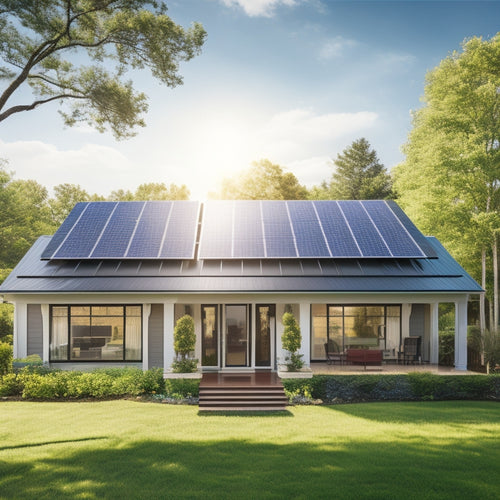
Residential Battery Backup
Share
You rely on a stable power supply to keep your home comfortable, safe, and connected, which is where a residential battery backup system comes in - providing peace of mind during unexpected outages and ensuring your critical appliances remain operational. By seamlessly shifting to backup power, you'll maintain daily routines and family well-being, even when the grid fails. With the importance of backup systems growing due to increasing weather events and grid failures, you'll want to examine the key components, including clean energy sources, deep cycle battery technology, and proper charging and maintenance. As you investigate your options, you'll uncover the subtleties that make all the difference in reliable backup power.
The Essentials
- Residential battery backup systems provide reliable power during emergencies, ensuring critical appliances remain operational and preventing food spoilage.
- These systems promote reliance on clean energy sources, significantly lowering fossil fuel dependence through solar or wind power integration.
- Deep cycle battery technology plays a crucial role in maximizing renewable energy storage, with factors like chemistry type and cycle life expectancy influencing performance.
- Proper charging and maintenance practices are essential for prolonging battery life, including avoiding deep discharges and ensuring correct configuration of the charging system.
- Accurate sizing of battery systems requires analyzing energy consumption habits, evaluating daily schedules, and identifying high-energy devices to power during outages.
Reliable Power During Outages
You expect your home's power to be available when you need it, but grid outages can happen anytime.
A residential battery backup system provides power during emergencies, ensuring your critical appliances remain operational. Additionally, it prevents food spoilage and maintains safety by keeping refrigeration and lighting systems running Home Energy Storage.
With a reliable backup system, you'll have peace of mind knowing you're prepared for unexpected outages.
Power When You Need
As severe weather events and grid failures become increasingly common, having a reliable source of power during outages is essential for maintaining your daily routine and safeguarding your family's well-being. With a residential battery backup system, you can rest assured that you'll have power when you need it most.
| Benefits | Description |
|---|---|
| Solar Integration | Store excess energy generated by your solar panels during the day for use at night or during outages |
| Cost Savings | Reduce your energy bills by using stored energy during peak hours |
| Reliability | Enjoy uninterrupted power supply during grid failures or natural disasters |
Backup During Emergencies
Severe weather events and grid failures can strike at any moment, leaving you without power when you need it most. That's why having a reliable residential battery backup system is essential for emergency preparedness.
With a backup system in place, you'll have peace of mind knowing you'll have power during outages. Having a reliable power storage system, such as a Renewable Energy System, can guarantee your family's comfort and well-being by keeping lights, internet, and communication devices powered on.
When the grid goes down, your battery backup system kicks in, providing you with a seamless shift to backup power. This means you'll have continuous power for essential appliances like refrigerators, medical equipment, and communication devices. You'll be able to stay informed, stay safe, and stay connected until power restoration.
A residential battery backup system is designed to provide you with reliable power during emergencies. It's an investment in your freedom and independence, giving you the ability to take control of your energy needs.
Reduced Carbon Footprint Guaranteed
With a residential battery backup system, you're not only ensuring reliable power during outages, but you're also taking a considerable step towards reducing your carbon footprint.
By integrating a clean energy source, such as solar or wind power, you'll greatly lower your reliance on fossil fuels. Additionally, with the help of deep cycle batteries and inverter technology, you can optimize your energy efficiency and make the most of your renewable energy systems Net metering.
As a result, you'll be emitting fewer greenhouse gases and contributing less to climate change, making a positive impact on the environment today.
Clean Energy Source
How do you guarantee a reliable source of clean energy for your home while reducing your carbon footprint? One way is through solar integration, which allows you to utilize the power of the sun and store excess energy in your residential battery backup system.
This setup not only provides energy independence but also enhances grid resilience, ensuring a steady supply of power even during outages.
By opting for clean energy, you'll reap sustainability benefits, including reduced greenhouse gas emissions and a lower environmental impact. Additionally, you'll enjoy cost savings through reduced reliance on the grid and potential government incentives for adopting renewable energy solutions.
When considering installation, factors such as system size, battery type, and charging strategy come into play.
As future technology advances, your energy storage system will be able to adapt and improve, ensuring you stay at the forefront of clean energy innovation.
Lower Emissions Today
Your residential battery backup system is a powerful tool in the fight against climate change, and it starts making a difference from day one. By utilizing clean energy from the grid or your own renewable sources, you're reducing your reliance on fossil fuels and lowering your carbon footprint. This means you're contributing to a more sustainable future, one that's free from the grip of energy monopolies.
Here's a breakdown of the emissions reduction you can expect:
| Energy Source | Emissions Reduction | Benefits |
|---|---|---|
| Renewable Energy | 75-90% | Sustainable living, energy independence |
| Grid Energy (off-peak) | 40-60% | Reduced strain on grid, lower energy bills |
| Fossil Fuels | 0-20% | Minimal impact, still reliant on non-renewable sources |
With a residential battery backup system, you're guaranteed to reduce your carbon footprint. By choosing sustainable energy sources and optimizing your energy usage, you're taking an essential step towards a cleaner, more independent energy future.
Deep Cycle Battery Technology
You're evaluating deep cycle battery technology for your residential battery backup system, and it's vital to comprehend the two primary factors that affect its performance: battery chemistry types and cycle life expectancy.
When selecting a deep cycle battery, it's important to assess the overall efficiency and durability of your system, as well as the ability to maximize renewable energy storage and reduce reliance on the grid.
The type of battery chemistry you choose, such as lead-acid, lithium-ion, or nickel-cadmium, will impact the overall efficiency and durability of your system.
Battery Chemistry Types
Deep cycle batteries, the backbone of residential battery backup systems, rely on various chemistry types to store and release electrical energy. When selecting a battery chemistry type, you'll encounter lead acid, lithium-ion, and other options.
Lead acid batteries, while cost-effective, have limitations, such as lower energy density and shorter lifespan. Lithium-ion batteries, on the other hand, offer advantages like higher battery efficiency, faster discharge rates, and longer lifespan. However, they come at a higher cost.
Safety considerations are also essential, as lithium-ion batteries require careful monitoring to prevent overheating. You'll need to weigh the maintenance requirements, environmental impact, and recycling options of each chemistry type.
For instance, lithium-ion batteries have a higher environmental impact due to resource extraction, but they can be recycled. Lead acid batteries, although heavier and bulkier, are more environmentally friendly and easier to recycle.
Cycle Life Expectancy
When evaluating battery chemistry types for your residential battery backup system, it's vital to contemplate the cycle life expectancy of deep cycle batteries. This refers to the number of charge and discharge cycles a battery can withstand before its capacity drops to 80% of its initial value.
A longer cycle life expectancy means you'll need to replace your batteries less often, resulting in lower maintenance costs and reduced waste.
You should expect a high-quality deep cycle battery to last for around 3,000 to 5,000 cycles, depending on factors such as charging efficiency and battery maintenance.
To maximize cycle life, it's important to follow proper charging and maintenance procedures. This includes avoiding deep discharges, keeping the battery at room temperature, and making sure the charging system is configured correctly.
Consider Your Energy Demands
When sizing a residential battery backup system, you need to evaluate your energy usage patterns and daily power needs.
With the rise of renewable energy storage solutions like Tesla Powerwall and LG Chem RESU, homeowners can now store excess energy generated from solar panels for later use.
Your energy demands will influence the required battery capacity, inverter size, and overall system configuration.
Energy Usage Patterns
Understanding your energy usage patterns is essential for selecting the right residential battery backup system. You need to know how you use energy to determine the capacity and type of system that will meet your needs. This involves analyzing your energy consumption habits, including the time of day you use the most energy and the devices that consume the most power. By doing so, you can identify patterns and trends that will help you forecast your energy needs.
To accurately forecast your energy consumption, you'll need to evaluate factors like your daily schedule, the number of people in your household, and the types of appliances you use.
You should also assess seasonal changes in your energy usage, such as increased heating or cooling demands during extreme weather conditions. By understanding your energy usage patterns, you can choose a residential battery backup system that provides the right amount of power when you need it, giving you the freedom to live life on your own terms, without worrying about energy outages or blackouts.
Daily Power Needs
You likely have a general idea of your daily energy demands, but it's essential to dig deeper to determine the specifics. To accurately size a residential battery backup system, you need to calculate your daily power needs. This involves evaluating your energy usage patterns, including the devices you use, how often you use them, and their respective power ratings.
Start by making a list of all the appliances, lights, and devices you want to power during an outage. Then, estimate their daily consumption in watt-hours (Wh). Consider energy efficiency when selecting appliances, as this will reduce your overall daily power needs. For example, LED bulbs use considerably less energy than incandescent bulbs.
Add up the total daily consumption of all your devices to determine your overall energy demand. This will give you a clear representation of the minimum battery capacity required to meet your needs.
Longer Cycle Life Warranty
You'll want to contemplate a battery's life expectancy when evaluating a longer cycle life warranty.
A battery's cycle life refers to the number of charge and discharge cycles it can handle before its capacity degrades.
A longer warranty period typically indicates a manufacturer's confidence in their product's ability to withstand more cycles without significant capacity loss.
Battery Life Expectancy
Reliability is a cornerstone of residential battery backup systems, and an essential aspect of this reliability is battery life expectancy. You want your system to provide backup power when you need it most, and a long-lasting battery is vital to achieving this goal.
When evaluating battery life expectancy, consider the number of charge and discharge cycles a battery can handle before its capacity degrades. A higher number of cycles means a longer battery life. Look for manufacturers that offer a longer cycle life warranty, as this indicates their confidence in their product's performance.
To maximize your battery's lifespan, follow ideal charging practices and adhere to proper battery maintenance tips. Avoid deep discharging, as this can reduce the battery's overall lifespan.
Keep your battery in a cool, dry environment, and verify it's not overcharged or undercharged. By following these guidelines, you can enjoy a longer battery life and a more reliable residential battery backup system.
Frequently Asked Questions
Can I Use My Residential Battery Backup for Off-Grid Power?
If you're planning to go off-grid, you'll need to guarantee your battery backup system can handle the load. Check your battery capacity to see if it's compatible with off-grid power; if not, you may need to upgrade or add more batteries to achieve energy independence.
Will My Battery Backup System Require Regular Maintenance?
Like a well-oiled machine, your battery backup system needs regular tune-ups to hum along efficiently. You'll need to perform routine checks to maximize battery lifespan and minimize maintenance costs, ensuring your off-grid power remains reliable and cost-effective.
Are Residential Battery Backup Systems Compatible With Solar Panels?
When you consider energy storage solutions, you'll find that solar compatibility is a key feature, allowing you to utilize renewable energy and store it for later use, and residential battery backup systems are designed to seamlessly integrate with solar panels for ideal energy independence.
Can I Customize My Battery Backup System to Fit My Needs?
Crafting your custom energy solution, you can carefully calibrate battery capacity to meet your unique needs, leveraging advanced energy management systems to optimize power flow and guarantee seamless backup during outages, giving you freedom from grid dependence.
Will My Residential Battery Backup System Increase My Property Value?
When you invest in energy independence, you'll likely see an increase in your property value, as a property appraisal will reflect the added benefits of self-sufficiency, making your home more attractive to potential buyers in the future.
Final Thoughts
You've made the smart decision to invest in a residential battery backup system. Now, imagine the peace of mind that comes with reliable power during outages, a reduced carbon footprint, and the latest deep cycle battery technology. You might be thinking, "But what about the upfront cost?" Think of it this way: it's a one-time investment in your home's resilience and the environment. Plus, with a longer cycle life warranty, you'll be saving money in the long run.
Related Posts
-

Renewable Energy Solutions to Reduce Your Carbon Footprint
To reduce your carbon footprint, adopting renewable energy solutions is key. Using solar panels or wind turbines can ...
-

Top-Rated Home Solar Power Kits for Achieving Energy Independence
Top-rated home solar power kits enable you to achieve energy independence by greatly cutting your energy costs. You c...
-

Home Solar Installation Cost
You're considering installing solar panels on your home, and the upfront cost is likely the biggest hurdle standing i...


